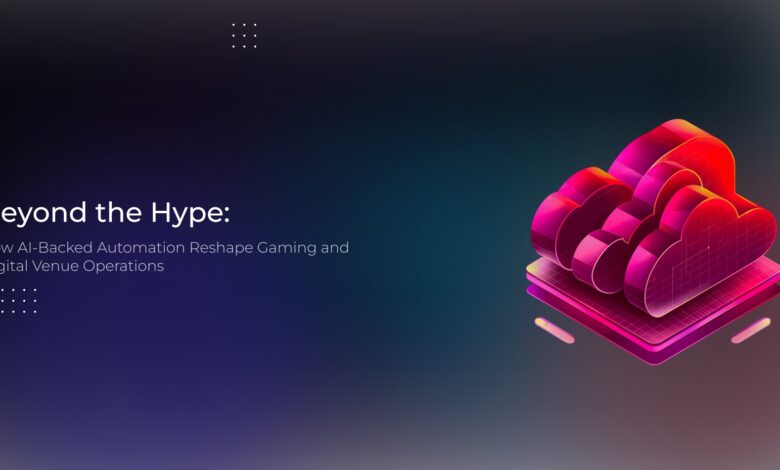
1. From “AI Buzz” to a Quiet Revolution in Operations
Artificial intelligence is everywhere in the headlines. Every week, there’s a new claim about how AI will replace entire industries or single-handedly run billion-dollar businesses with zero human staff. But on the ground, where actual business owners and operators live, the story is far more nuanced. And frankly, it’s more useful.
In the gaming and digital entertainment space, we’re seeing a different kind of transformation. It’s not about replacing people, but about automating repetitive, error-prone, or compliance-heavy tasks so that human teams can focus on creating standout experiences.
The AI in games market is projected to grow from $2.44 billion in 2024 to $2.89 billion in 2025 at a CAGR of 18.8%, and is expected to reach $5.75 billion by 2029. Another projection places the market at $8.29 billion by 2029, growing at an annual rate of 30%. This underscores that the adoption of AI and automation is not just hype—it’s a rapidly expanding reality in operational infrastructure.
It’s a quieter revolution, but arguably the one that matters most.
2. Three Operational Areas Where Smart Automation is Delivering
24/7 Multi-Language Support & Incident Triage
Anyone running a gaming center, campus lab, or public digital hub knows downtime kills customer trust and eventually revenue. Traditionally, that meant hiring local tech staff or paying for on-call admins who may or may not be available when systems glitch.
But automated incident detection combined with smart support systems has changed the calculus. Here’re some vendor facts:
- AI-powered incident triage can cut administrative time by up to 90%, enabling faster hand-offs and more consistent reporting for support and security teams.
- Conversational AI intake agents now replace static forms, capturing complete, context-rich details and instantly routing incidents to the right teams, eliminating delays and manual queues.
For example, we work with venues across the USA where the average support response is under 15 minutes, in six different languages, around the clock. That’s not sci-fi AI, but it’s still transformative. Owners no longer stress about local expertise or costly internal hires. They can rely on a managed system that monitors itself, flags anomalies instantly, and coordinates human intervention when truly needed.
At the end of the day, their staff spend less time troubleshooting and more time greeting guests, organizing events, or marketing new services.
Dynamic Compliance & Payments: Less Manual Chasing
Cash register audits, local tax compliance, multi-currency setups — they’re make-or-break for international operators. Smart modules paired with local payment integrations mean systems now dynamically adapt pricing, handle receipts, and prepare audit-ready reports automatically. As payment providers revealed, over 15% of online transactions fail due to processing issues; intelligent payment routing can reduce failure rates by up to 40% through automated orchestration
For businesses scaling across borders (or even just trying to pass local tax inspections without fines), it’s a game-changer. Automation fueled by AI tools here reduces both administrative overhead and risk, letting teams concentrate on growth, not paperwork.
Keeping Content Fresh Without Human Intervention
Gaming centers and campus labs live or die by their content — the latest titles, stable patches, creative software running without a hitch. Traditionally, maintaining dozens or hundreds of machines meant manual updates, sneaking in after hours, or enduring player frustration when outdated games crashed mid-session.
Today, diskless or hybrid systems automatically patch games, even during active play, with no local tinkering required. Administrators get a single dashboard view, can push or schedule updates, and stay confident every device is aligned.
In our experience, this single shift — from manual to automated content management — cuts hours of repetitive work weekly. More importantly, it improves the end-user experience, which is what ultimately drives loyalty and referrals.
3. Lessons for Other Founders & Operators
The lesson is simple: you don’t always need the flashiest deep learning models to transform your business. Often, the highest ROI comes from solid, well-architected automation that:
- Frees staff from predictable, non-value tasks.
- Reduces compliance and operational risks.
- Lets the human team focus on experience, community, and innovation.
This has implications beyond gaming. Any sector relying on distributed hardware, dynamic content, and local compliance stands to benefit — from retail demo zones to smart classrooms.
4. Balancing Automation with Human Trust
One final insight: even as we lean into AI-driven automation, trust remains human.
Customers still feel most secure when they see real staff. Business owners still value relationships with responsive teams, not just an algorithm churning in the background. That’s why we combine proactive systems that monitor, patch, and alert automatically with dedicated human support — blending tech scale with personal accountability.
The future isn’t AI replacing every role. It’s smarter systems handling the grunt work, so people can focus on what people do best: building relationships, inspiring loyalty, and spotting the next big opportunity.
Conclusion
Automation doesn’t eliminate human work. It just makes the latter matter more.
For growing digital venues, gaming hubs, and future-ready campuses, that’s the most practical AI revolution of all: hybrid teams where technology handles the scale, and people handle the trust.





